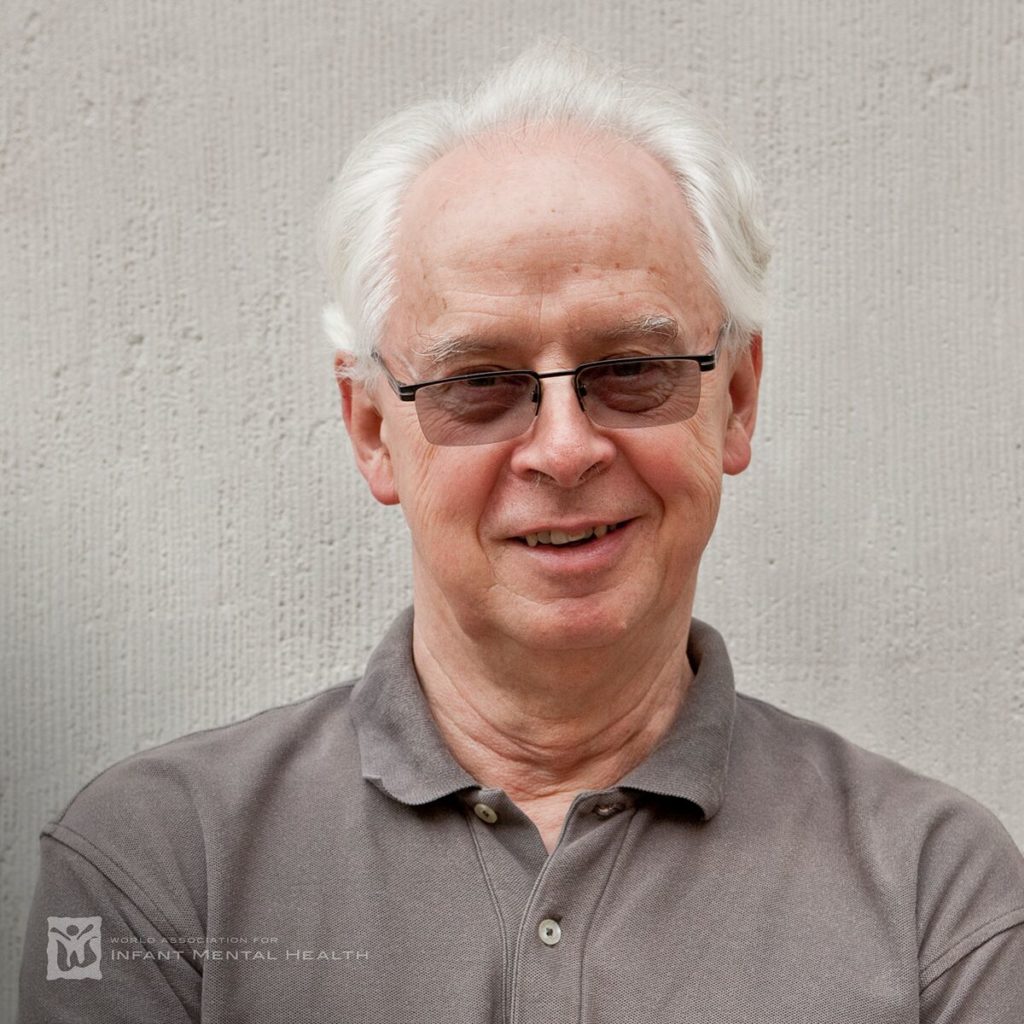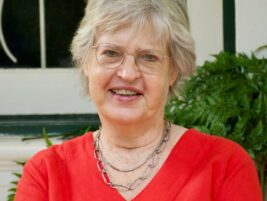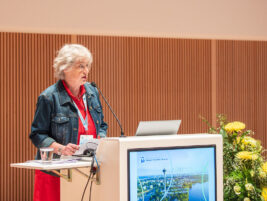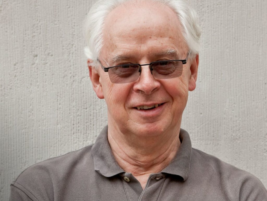I feel very privileged to be able to write to you, the members, as President of WAIMH, through our official publication “Perspectives in Infant Mental Health” so creatively edited by Maree Foley, Geneva. WAIMH is an important and diverse organisation, now in its 40th year: founded in 1980 as the World Association for Infant Psychiatry, with our first conference in Nice, France.
We have seen many things happen in our world over this time, but perhaps nothing impacting so many people globally and so extensively as the current COVID-19 pandemic. As a strong professional affiliation of colleagues working in infant mental health, it is even more important now, that we share our understanding, research, and practice ideas in the service of helping infants and families through these current crises. We also need to be supporting each other.
In this address, I provide an update about the WAIMH Board and the WAIMH 2021 Congress. I encourage us all as a WAIMH community to keep connected with each other during this global COVID-19 pandemic.
The WAIMH Board: An update
We have a wonderful team of dedicated infant mental health clinicians on the Board of Directors who are supported by the amazing work of Minna Sorsa and Sari Miettinen at the WAIMH office headquarters, located generously at Tampere University, in Finland. The activities of WAIMH would not occur without the ongoing dedicated commitment of our Executive Director Prof Kaija Puura and our Associate Executive Director Prof Reija Latva who commit much of their personal time to translating creative ideas into action for infants.
Following a selection process earlier this year, I am so pleased that we have been able to appoint Prof Astrid Berg as the President-Elect of WAIMH and that Prof Hisako Watanabe has been re-elected as a full member of the Board of Directors. Hisako has done extraordinary work throughout Japan, Asia, and beyond advocating for babies, and drawing infant and early childhood mental health clinicians together. Catherine Maguire from Cork, Ireland is now the Secretary-Treasurer of the Board as well as leading the organisation of the 17th WAIMH Congress in Dublin, which will follow the WAIMH Brisbane Congress in 2021.
Over the last 4 years or so I had the pleasure of working closely with Dr Jody Todd Manly from Rochester, New York, who was appointed by Past President, Prof Kai von Klitzing as the President’s Executive at Large. Jody has participated in our congresses and board meetings over this time and contributed enormously to the Board activities. Jody has helped coordinate public communications from the board, and as associate editor of Perspectives has supported the past Editor-in-Chief Dr Deborah Weatherston and current Editor-in-Chief, Dr Maree Foley in transforming the publication into an evolving online vibrant communication. I wish to thank Jody so much for her dedicated contributions and look forward to her ongoing participation in WAIMH activities and links with us.
In sustaining strong links with our colleagues in North America, I have invited Dr Chaya Kulkarni from Canada to be the next President’s Executive at Large. Chaya is the Director of Infant Mental Health Promotion (IMHP) based at the Hospital for Sick Children, Toronto, Canada. Chaya has been committed to promoting infant mental health throughout Ontario, and indeed throughout Canada. For example, she has been engaged in advising government on the mental health needs of infants and families as well as influencing policy and service development. I am very excited that Chaya is part of the Board team. I know that Chaya has some wonderful creative ideas that will support us in the mission of WAIMH in the near future.
A Congress Update
Although we did not meet in person in Brisbane in June this year as intended, we will still have our Congress in 2021. The 17th WAIMH International Congress will be held in Brisbane from 22-26 June 2021 and this represents an important opportunity for us to honour infants and their families by sharing our understanding of the troubles that they face and how we may be able to help. This is a chance for us to share with each other what we’ve learned from our clinical work, our research, the efforts of our public health services, and from working directly with, and supporting vulnerable infants and families in our own countries.
The WAIMH Congress in Brisbane will be a hybrid Congress in that you will be able to participate in a lively and interactive way from your home or office in your own country, or if travel allows you, by being in Brisbane in person. The Congress organisers and the Scientific Program Committee are working to ensure that even more people can participate than before.
The Congress theme of “Creating Stories in Infant Mental Health: Research, Discovery and Regeneration” could not be more pertinent to the task facing us just now. Everyone has stories to share about the traumas experienced by infants and their parents and everyone has stories to share about the innovative ways we have responded to try to ameliorate their distress and the impact on the infant’s inner world and development. Thus right from the beginning the baby is at the centre of our actions, because, to quote Colwyn Trevarthen, the newborn arrives “with emotions and motives for action which sustain intersubjectivity”.
I am sure that each of you will have stories to share at our Congress about the impact of global or localised trauma upon the baby’s own inner world and relationships. In my work over the last 9 months, I have learned a lot about how babies and parents can connect with us via telehealth and video/telephone. For example, from the way the baby as patient can use gaze, their gestures, and their voice through small screens. It can be as if you are there in the same room. Playfulness can travel back-and-forth from screen to screen.
Maybe this is not surprising when we look back over the work of Spitz, Winnicott, Tronick, Trevarthen, Emde, Stern and others who showed us how attuned infants are to crucial social communications from others. I use the term baby as patient because it is important that we acknowledge that the baby can suffer in emotional ways, as may we. We must acknowledge the baby’s distress, and not avoid it.
At the Congress we will also be very keen to learn more about the positive resources that infants and families may draw upon. The COVID-19 pandemic provides opportunities for doing things differently from before and to learn from some of the qualities of the human condition that sees positive adaptation in the face of stress. Our work with babies and parents, will be very different after this.
Regarding the Congress submission process, if you have already submitted an abstract which has been accepted, you need to do no more at this stage. Our Congress committee were very keen to create space for new developments in response to COVID-19. So, we extended the abstract submission process (to 18 October 2020) to create an opportunity for you to share new developments as they relate to the impact upon infants, families, and healthcare systems of the COVID-19 pandemic.
We look forward to meeting with you in person or virtually at the Congress in Brisbane next year. Each one of us will have experienced the impact of the current global crisis in some way, and we hope that the Congress will provide an opportunity for supporting each other in our work.
Keeping connected and keeping babies in mind as a WAIMH Community through COVID-19
Although the impact of the COVID-19 pandemic globally has been frightening, we also know that so many of the world’s infants and families face many other vicissitudes, problems, and frightening scourges. Many of these will be intensified by the global pandemic.
Around the world there are many profound and distressing challenges facing infants and their families. These have all been intensified in the context of the COVID-19 pandemic. We know that some 46 million people have been infected with this virus, and over 1.15 million people have died (World Health Organization October 2020). Babies are now arriving into a world, which is very different to the one that babies were born into, just last year. The COVID-19 pandemic brings with it a serious increase in poverty, unemployment, lack of access to medical care and immunisation, and intrafamilial tension and violence. We have seen global catastrophes before, such as world wars, famine and other pandemics, and our early pioneers in infant mental health played critical roles in recovery for families within their societies.
Compounding the experience of illness and death for so many millions has come isolation, loss, and bereavement along with major increases in unemployment, stress family disruption and family violence. There has been widespread cancellation of childhood vaccination programs, with many children, adolescents, and adults not able to go to school or work, and becoming more and more isolated (Fore, 2020).
Being pregnant and having a baby through this pandemic has for many been terrifying and distressing (Wu et al., 2020) with parents fearful of the effect of the virus itself on the foetus and the mother. This has coexisted with the fear and distress of not being able to have the close support of family and friends during labour and the postnatal period.
So, it is important as infant mental health professionals, that we respond to the specific stresses and strains brought by the pandemic while also not losing sight of the pre-existing urgent pressures on babies and parents. At the moment, there are major refugee camps in Bangladesh, Uganda, Jordan, Tanzania, and Ethiopia, and other countries.
There are currently hundreds of thousands of infants facing dislocation, starvation, loss of parents in the context of war, and fleeing from profound conflict. 2.6 million refugees live in camps and millions more live in other settlements far from their homelands. In the Rohingya refugee camps in Bangladesh less than 1% of children have access to secondary education and there is limited access to proper shelter food healthcare water sanitation and emergency relief. Many young children are separated from their parents as they flee from one country to another, and this separation is sometimes calculated and cold hearted.
WAIMH has taken a strong stand in support of infants’ rights publishing the WAIMH Position Paper on the Rights of Infants (2016). In the November/December edition of the Infant Mental Health Journal the WAIMH Position Paper on Infants Rights in Wartime described the lack of recognition of the impact of violent conflict upon the psychological, relationship and developmental needs of infants, insisting that we need to do more for the world’s infants to recognise their identity as persons, assert their emotional and physical safety need for psychological care (Keren, Abdallah, & Tyano, 2019).
Closing reflections
As time goes on, we will be learning about different ways of doing things.
There are opportunities to develop new ways of being with mothers, fathers, and babies, through the use of video, social media, and professional telehealth facilities.
Although we have been very worried about the impact upon babies of interacting with necessarily masked carers and clinicians, we can also see that babies have their own resources and resilience. For example, infants use gaze, vocalisation, and other social communicative aspects of interaction to connect with their important caregivers.
We do not yet fully know the impact of masks or quarantining upon infants and their development, although we do know that major illness, and loss of loved ones and immediate family members can have a profound enduring adverse impact on infants.
Earlier this year, through the generosity of our esteemed infant mental health and paediatric colleagues, we were able to deliver, in collaboration with AAIMH UK, the Australian Association for Infant Mental Health, hand the Parent-Infant Foundation, UK, three webinars highlighting the importance of keeping our focus on the needs of the infant in this time of crisis.
Building on the past and looking to the future
We are now planning further webinars for WAIMH members and our Affiliates late this year and in the run-up to the Congress in Brisbane in 2021. We hope you find the webinars stimulating and professionally useful.
The remarkable opportunities for connectedness with modern virtual conferencing will invigorate the affiliative structure of WAIMH. We have 58 Affiliate organisations around the world, so with social media, the WAIMH website and the new medium of online webinars with individual passion for our work, we can reach out, touch, and share together. Each of these complement our crucial publications, the Infant Mental Health Journal and Perspectives in Infant Mental Health. To be effective however, we need to continually reflect on our work and our therapeutic methodologies in a collegial and supportive way.
I really hope everyone can join us in person, or virtually, at the 17th Congress in Brisbane in June 2021. The Congress Local Organising Committee and Scientific Program Committee with the dedicated support of the WAIMH Executive Directors, and our team in the WAIMH Office are building what I believe will be truly marvellous “hybrid” Congress where we will be able to focus our attention on babies, the challenges they face, their essential needs, and how we can build and support families and societies to sustain healthy development. We have entered a new era of global connection but also a world besieged, and even more we need to keep the baby within the family at the centre of our professional attention.
References
Fore, H. H. (2020). A wake-up call: COVID-19 and its impact on children’s health and wellbeing. The Lancet Global Health, 8(7), e861-e862.
Keren, M., Abdallah, G., & Tyano, S. (2019). WAIMH position paper: Infants’ rights in wartime. Infant Mental Health Journal, 40(6), 763-767.
Wu, Y., Zhang, C., Liu, H., Duan, C., Li, C., Fan, J., . . . Li, X. (2020). Perinatal depressive and anxiety symptoms of pregnant women along with COVID-19 outbreak in China. American Journal of Obstetrics and Gynecology, 240.e9.
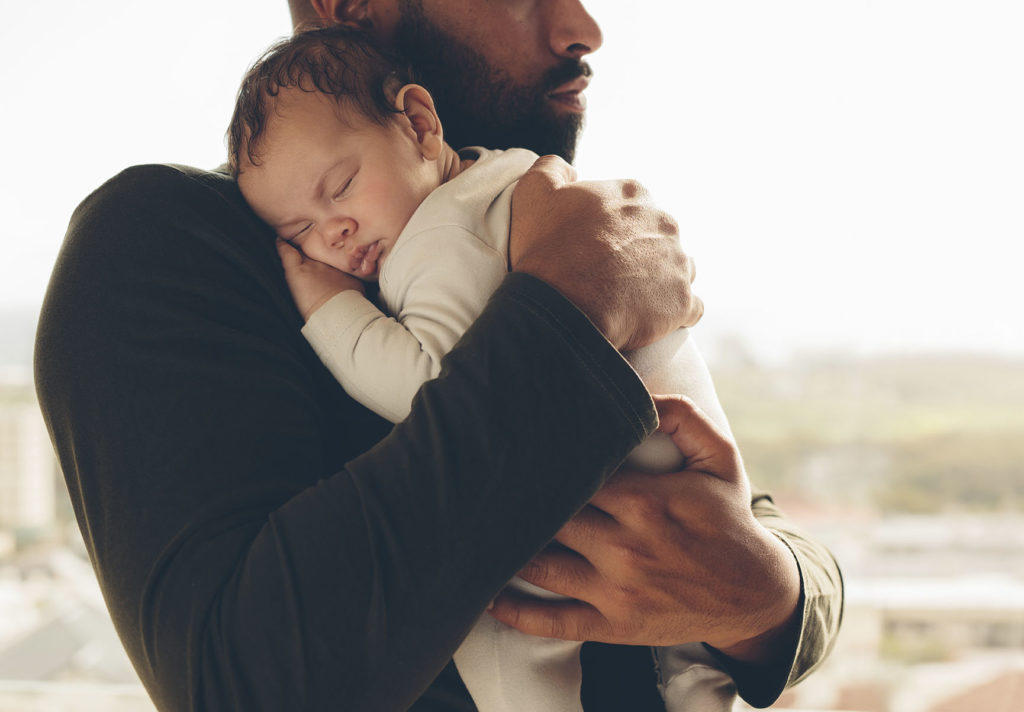
Authors
Associate Professor Campbell Paul, President of WAIMH , Melbourne, Australia


